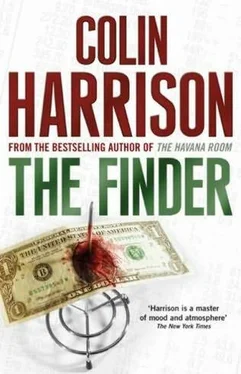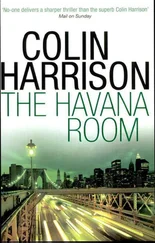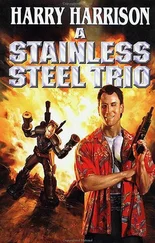Colin Harrison - The Finder
Здесь есть возможность читать онлайн «Colin Harrison - The Finder» весь текст электронной книги совершенно бесплатно (целиком полную версию без сокращений). В некоторых случаях можно слушать аудио, скачать через торрент в формате fb2 и присутствует краткое содержание. Жанр: Триллер, на английском языке. Описание произведения, (предисловие) а так же отзывы посетителей доступны на портале библиотеки ЛибКат.
- Название:The Finder
- Автор:
- Жанр:
- Год:неизвестен
- ISBN:нет данных
- Рейтинг книги:4 / 5. Голосов: 1
-
Избранное:Добавить в избранное
- Отзывы:
-
Ваша оценка:
- 80
- 1
- 2
- 3
- 4
- 5
The Finder: краткое содержание, описание и аннотация
Предлагаем к чтению аннотацию, описание, краткое содержание или предисловие (зависит от того, что написал сам автор книги «The Finder»). Если вы не нашли необходимую информацию о книге — напишите в комментариях, мы постараемся отыскать её.
The Finder — читать онлайн бесплатно полную книгу (весь текст) целиком
Ниже представлен текст книги, разбитый по страницам. Система сохранения места последней прочитанной страницы, позволяет с удобством читать онлайн бесплатно книгу «The Finder», без необходимости каждый раз заново искать на чём Вы остановились. Поставьте закладку, и сможете в любой момент перейти на страницу, на которой закончили чтение.
Интервал:
Закладка:
From an organizational viewpoint, these two CorpServe divisions were remarkably "flat"; one person ran each, supervising the work crews and schedules from the company's run-down warehouse in the Red Hook section of Brooklyn. Jin Li had picked this location because it was cheap and out-of-the-way yet relatively close to Manhattan. No one much bothered with the CorpServe trucks coming and going there. Another person handled the bookkeeping and payroll for the two divisions. These operations were sufficiently profitable to justify the existence of CorpServe.
But it was the third function of CorpServe that both Chen and Jin Li fixated upon. This part, which generated no organizational paper work, and indeed was never mentioned or described in writing, combined select elements of the other two. The idea was simply to steal useful information. When the cleaning division worked in offices that generated wastepaper that looked potentially valuable to Jin Li, she tried mightily to underbid the shredding contract for that building, if there was one. Sometimes she was successful and thus gained legitimate access to the stream of desired waste information. This meant that her company not only removed the information but also controlled it after removal. Then it was a matter of segregating the material that should not be shredded. Of course sometimes she was not successful in underbidding the shredding contract and no information could be removed on a regular basis. One of Chen's principles was that no nonrefuse documents be stolen from offices, a directive she agreed with. That was too risky, would draw attention if discovered. Theirs was a quiet, subtle play in which companies were paying them to remove valuable information. If there were ever a question about a particular bag of waste, why it had not been shredded, then Jin Li could just say a mistake had been made, bags had gotten mixed up. But no mistake had ever been made.
Until now, that is. What was it?
Jin Li had supervised all three operations, only occasionally appearing at one or another of the legitimate cleaning or shredding locations, but five nights a week riding with mobile shredder #6 (a lucky number for the Chinese) as it appeared at the small number of locations she wanted to plunder for information. She always wore a baggy blue CorpServe uniform, removed her makeup, tucked her hair up under a cap, and presented her company ID if asked. The security officers in the buildings either recognized her as the supervisor or knew that cleaning company staffs had a lot of turnover and didn't bother to question a diminutive Chinese woman in uniform with an ID clipped to her breast pocket. Except for the driver of #6, the other CorpServe staffers didn't know her true role. She was just the shift supervisor who sometimes removed waste herself. The promising stuff made it into the "blue bags," as they were called, and these were set aside for careful scrutiny later. If any of the cleaners seemed too interested in Jin Li's activities, Jin Li quickly praised the woman on her excellent work, shifted her to one of the legitimate cleaning operations, and gave her a marginal raise.
As she prowled the target businesses at night, Jin Li moved with light-footed efficiency, for if you clean offices every day, you know a lot about them. Typically she received plans of the floors that CorpServe cleaned and made a point always to ask if there were any sensitive elements of the job, such as a CEO who stayed late, which offices needed to be vacuumed daily because of allergies, which vacuumed less frequently, etc. All in the guise of providing excellent service, which in fact CorpServe did. Very often the response by management pinpointed exactly which office or offices were most valuable. Jin Li had learned that secretaries and assistants had better trash than their supervisors, because they made drafts of responses, copied e-mail, and so on. But that was not all! CorpServe could also provide, if asked, another service: secure, lockable plastic bins marked TO BE SHREDDED, an assistance that companies liked, since it efficiently segregated sensitive documents away from the eyes of their own not-so-trustworthy employees. Of course these bins usually contained the very best information Jin Li most wanted, or, put another way, CorpServe's clients were paying it extra money to more efficiently steal the very information they most wanted destroyed. She had keys that fit all of the different makes of these bins, and it was a matter of quickly emptying them into a bag that she would later inspect. People were amazingly sloppy with paper, especially now that everyone used computers. Companies spent enormous sums on their internal and external computer security, hiring an endless string of geniuses, wizards, and solemn soothsayers to implement every manner of state-of-the-art antihacking protocols. Paper, however, was by definition superfluous, since every document and e-mail existed somewhere on a computer. And because things were not "saved" on paper anymore, they were less likely to be "filed" away. Paper had become the temporary, disposable manifestation of the electronic file, convenient for carrying around but not worth being careful with. You could always print out another copy.
All this was true from one office to the next. Some had security procedures, but these were rarely enforced with any regularity. People in New York offices were too busy, too pressured, too ambitious to worry about their wastepaper. It was someone else's problem.
Which was also to say it was Jin Li's opportunity. She had learned to avoid certain industries and to target others. Law firms had some value, especially if they had a mergers-and-acquisitions department, a fact easy enough to determine. But the short-term value of these papers was so obvious, not to mention subject to SEC security regulations, that the law firms generally went to great lengths to destroy their paper. Publishing and media companies, by contrast, had absolutely no value. Retail banking was useless. Insurance companies were useless too, except if they had a corporate liability department, which had the potential to be a gold mine if documents revealed a company facing huge undisclosed problems, such as product lawsuits. The companies underwriting corporate bonds had some value, since they evaluated the underlying creditworthiness of the companies whose debt they peddled. Pharmaceutical companies were good, when you could find one with interesting product research, but the best offices were financial services firms, which evaluated stocks, because what she wanted most was time-perishable information that immediately affected the price of a publicly traded company-stock prices generally reacting to information faster and more dramatically than do bonds. The information had to be so good, so privileged, that the analysts, journalists, stock pickers, inside leakers, and anyone else interested didn't already have it.
The global stock markets ran on the quaint theory that they were efficient, that is, that crucial information about publicly traded stocks was available very rapidly to any interested party; the reality, of course, was different. Companies lied, cheated, inflated profits, hid debts, booked phony business, and smilingly pretended that their exalted leaders were not dying or ineffective or irrevocably insane or, most typically, widely hated by insiders. Companies "smoothed" their data to appear more steadily profitable, developed products that bombed, suffered internal wars between personalities, between divisions, between the directors and management, between management and the rank and file, between stockholders and management. Internal disagreements could be mild, festering, explosive, litigious, even potentially violent. As one of Jin Li's professors at Harbin Institute of Technology had said, no matter how large and bureaucratized, no matter how rigid and repressive, corporations were ultimately just collections of human beings, subject to everything that both afflicted and elevated them-not unlike, the professor had reminded them, the collective farms created by Mao in the 1960s which, though meant to be efficiently productive, were disasters.
Читать дальшеИнтервал:
Закладка:
Похожие книги на «The Finder»
Представляем Вашему вниманию похожие книги на «The Finder» списком для выбора. Мы отобрали схожую по названию и смыслу литературу в надежде предоставить читателям больше вариантов отыскать новые, интересные, ещё непрочитанные произведения.
Обсуждение, отзывы о книге «The Finder» и просто собственные мнения читателей. Оставьте ваши комментарии, напишите, что Вы думаете о произведении, его смысле или главных героях. Укажите что конкретно понравилось, а что нет, и почему Вы так считаете.












